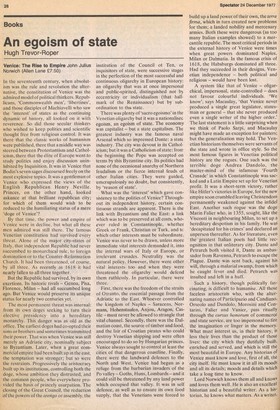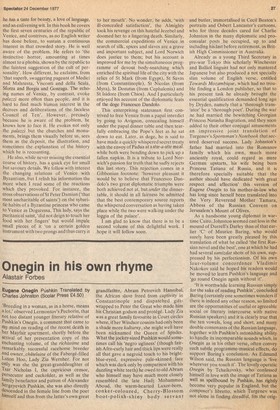Books
An egoism of state
Hugh Trevor-Roper
Venice: The Rise to Empire John Julius Norwich (Allen Lane £7.50) In the seventeenth century, when absolutism was the rule and revolution the alternative, the constitution of Venice was the admired model of political thinkers. Republicans, 'Commonwealth men', 'libertines', and those disciples of Machiavelli who saw the 'interest' of states as the continuing dynamic of history, all looked on it with reverence. So did those secular thinkers who wished to keep politics and scientific thought free from religious control. It was there that the classic works of humanism were published, there that a middle way was steered between Protestantism and Catholicism, there that the elite of Europe went to study politics and enjoy discussion uninhibited by Inquisition. It was in Venice that Bodin's seven sages discoursed freely on the most explosive topics. It was a gentleman of Venice who expressed the views of the English Republican Henry Neville. Princes, on the other hand, looked askance at that brilliant republican city; for which of them would wish to be reduced to the humiliating status of a mere 'doge of Venice'?
By that time, the power and empire of Venice were in decline, but what all these men admired was still there. The famous Venetian constitution had survived every threat. Alone of the major city-states of Italy, that independent Republic had never succumbed to monarchical rule, to foreign domination or to the Counter-Reformation Church. It had been threatened, of course, by all three. As recently as 1618 it had nearly fallen to all three together.
But the Republic had survived, by its own exertions. Its historic rivals — Genoa, Pisa, Florence, Milan — had all succumbed long ago. But Venice would preserve its unique status for nearly two centuries yet.
The most permanent threat was internal: from its own doges seeking to turn their elective presidency into a hereditary monarchy. This danger was as old as the office. The earliest doges had co-opted their sons or brothers and sometimes transmitted their power. That was when Venice was still merely an Adriatic city, nominally subject to Byzantium. Later, when a great commercial empire had been built up in the east, the temptation was stronger; but so were the restraints. Progressively the aristocracy built up its institutions, controlling both the doge, whose ambition they distrusted, and the common people, who everywhere provided the basis of princely usurpation. The closing of the Great Council, the reduction of the powers of the arenga or assembly, the institution of the Council ot Ten, or inquisitors of state, were successive stages in the perfection of the most successful and continuous oligarchy in European history: an oligarchy that was at once impersonal and public-spirited, distinguished not by eccentricity or individualism (that hallmark of the Renaissance) but by subordination to the, state.
There was plenty of `sacro egoismo' in the Venetian oligarchy but it was a nationalisec egoism, an egoism of state. The economy was capitalist — but a state capitalism. The greatest industry was the famous naval Arsenal which so impressed Dante: a state industry. The city was devout in its Catholicism; but it was a Catholicism of state: fron: the beginning the Pope was accepted on terms by this Byzantine city. Its politics had none of the occasional anarchy of Northern feudalism or the fierce internal feuds ot other Italian cities. They were guided, unscrupulously no doubt, but consistently, by 'reason of state'.
What was the 'interest' which gave consistency to the politics of Venice? Throughout its independent history, certain continuous strands are apparent. There is the link with Byzantium and the East: a link which was to be preserved at all costs, whoever ruled in Constantinople, whether Greek or Frank, Christian or Turk, and tc which other interests must be subordinate. Venice was never to be drawn, unless more immediate vital interests demanded it, into the internal wars of Italy or Europe, or irrelevant crusades. Neutrality was the natural policy. However, there were other vital interests too and when they were threatened the oligarchy would defend them ruthlessly. In particular, there were three.
First, there was the freedom of the straits of Otranto, the essential passage from the Adriatic to the East. Whoever controlled the kingdom of Naples — Saracens, Normans, Hohenstaufen, Anjou, Aragon, Castile must never be allowed to strangle that vital channel. Secondly, there was the Dalmatian coast, the source of timber and food,, and the lair of Croatian pirates who could destroy Venetian shipping and were often encouraged to do so by Hungarian princes. Venice always sought to control at least the cities of that dangerous coastline. Finally, there were the landward defences to the North and West. Venice had begun as a refuge from the barbarian invaders of the Po valley Goths, Huns, Lombards — and it could still be threatened by any land power which occupied that valley. It was in self defence, as well as to ensure its own food supply, that the Venetians were forced to build up a land power,of their own, the terra firma, which in turn created new problems for them; a landed nobility and mercenary armies. Both these were dangerous (as too many Italian examples showed) to a mercantile republic. The most critical periods in the external history of Venice were times when great powers dominated Naples, Milan or Dalmatia. In the famous crisis of 1618, the Habsburgs dominated all three. Had they succeeded in their designs, Venetian independence — both political and religious — would have been lost.
A system like that of Venice — oligarchical, impersonal, state-controlled — does not favour colourful individuals. 'We know', says Macaulay, 'that Venice never produced a single great legislator, statesman or general — that she never produced even a single writer of the higher order.' The last statement is a little surprising when we think of Paolo Sarpi, and Macaulay might have made an exception for painters; but the generalisation may hold. The Venetian historians themselves were servants of the state and wrote in office style. So the most famous figures in Venetian political history are the rogues. One such was the terrible doge Andrea Dandolo, the master-mind of the infamous 'Fourth Crusade' in which Constantinople was sacked and a Latin Empire set up for Venetian profit. It was a short-term victory, rather like Hitler's victories in Europe, for the new empire soon crumbled leaving Christendom permanently weakened against the infidel East. Another such rogue was the doge Mann Faller who, in 1355, sought, like the Visconti in neighbouring Milan, to set up a hereditary despotism in his family. He was 'decapitated for his crimes' and declared an unperson thereafter. As for literature, even the greatest Italian poets had little recognition in that unliterary city. Dante and Petrarch both visited it, Dante as ambassador from Ravenna, Petrarch to escape the Plague. Dante was sent back, against his will, through a malarial swamp, from which he caught fever and died. Petrarch was insulted and left in a huff.
Such a history, though politically fascinating, is difficult to humanise. All these faceless aristocrats who, with the alternating names of Participazio and Candiano, Orseolo and Dandolo, Morosini and Contarini, Falier and Vanier, pass ritually through the cursus honorum of commerce and state service, are too impersonal to fire the imagination or linger in the memory, What must interest us, in their history, is less their lives than the product of those lives: the city which they dutifully built, enriched and served, and which is still the most beautiful in Europe. Any historian of Venice must know and love, first of all, the city itself. He must know it in all its moods and all its details; moods and details which take a long time to know.
Lord Norwich knows them all and knows and loves them well. He is also an excellent historian and a beautiful writer. As a historian, he knows what matters. As a writer, he has a taste for beauty, a love of language, and an enlivening wit. In this book he covers the first seven centuries of the republic of Venice, and contrives, as no English writer has done. before, to sustain a continuous interest in that crowded story. He is well aware of the problem. He refers to 'the instinctive horror, amounting at times almost to a phobia, shown by the republic to the faintest suggestion of the cult of personality'. How different, he exclaims, from 'that superb, swaggering pageant of Medici and Malatesta, Visconti and della Scala, .Sforza and Borgia and Gonzaga. The echoing names of Venice, by contrast, evoke patazzi more often than people, and it is hard to find much !Inman interest in the decrees and deliberations of the faceless Council of Ten'. However, precisely because he is aware of the problem, he knows how to face it. He evokes not only the paluzzi but the churches and monuments, brings them visually before us, sees them as the deposit, the illustration, and sometimes the explanation or the history Which he is recounting.
He also, while never missing the essential course of history, has a quick eye for small but savoury details. We follow with interest the changing relations of Venice with Byzantium, but I relish his information the more when I read some of the reactions Which they provoked. For instance, the cross observations of St Peter Damian ('that most uncharitable of saints') on the sybaritic habits of a Byzantine princess who came to Venice as Dogaressa. This lady, says the Puritanical saint, 'did not deign to touch her food with her. fingers' but would impale small pieces of it 'on a certain golden instrument with two prongs and thus carry it to her mouth'. No wonder, he adds, 'with ill-concealed satisfaction', the Almighty took his revenge on this hateful Jezebel and doomed her to a lingering death. Similarly, the commercial expeditions of Venice in search of silk, spices and slaves arc a grave and important subject, and Lord Norwich does justice to them; but his account is improved for me by the simultaneous programme of devout body-snatching which enriched the spiritual life of the city with the relics of St Mark (from Egypt), St Savas (from Constantinople), St Nicolas (from Myra), St Donatus (from Cephalonia) and St Isidore (from Chios). And I particularly enjoyed his account of the diplomatic feats of the doge Francesco Dandolo.
This enterprising statesman first contrived to free Venice from a papal interdict by going to Avignon, concealing himself under the papal dinner table and then tearfully embracing the Pope's feet as he sat down to eat. Later, as doge, he is said to have made a quickly whispered secret treaty with the envoy of Padua at a tete-a-tete meal. while both were bending down to pick up a fallen napkin. It is a tribute to Lord Norwich's passion for truth that he sadly rejects this last story. This rejection comes in a Gibbonian footnote: 'however pleasant it would be to believe that Francesco Dandolo's two great diplomatic triumphs were both achieved not at, but under the dinnertable, it should in all fairness be admitted that the best contemporary source reports the whispered conversation as having taken. place while the two were walking under the loggia of the palace'.
I am glad to know that there is to be a second volume of this delightful work. I hope it will follow soon.











































 Previous page
Previous page